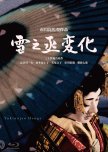"An actor's revenge certainly is dramatic"
An Actor’s Revenge was actor Hasegawa’s 300th film and a remake of his 1935 film by the same name. Both life and the play were equally theatrical and equally theatrically shot. The gender bending characters made me wonder if life was just an extension of the kabuki play or if it was a progressive look at gender.
Nakamura Yukinojo is a famous onnagata who stays in character on stage and off. At the age of seven, his parents killed themselves when a friend colluded with two powerful men to destroy his father’s company, leaving the family destitute. One of the conspirators, Sansai, the ex-magistrate of Nagasaki and his daughter Namiji attend Yukinojo’s play. Kawaguchiya, the perfidious employee and co-conspirator also is there. Namiji is the shogun’s concubine but falls hopelessly in love with Yukinojo, becoming ill when he refuses to meet with her. Fellow merchant Hiromiya is also revealed to be an accomplice as he takes an interest in Yukinojo. The actor plots to use innocent Namiji to bring the 3 men down. He's aided by a lookalike Robin Hood thief, Yamitaro.
The hardest hurdle to scale was actor Hasegawa Kazuo. He was 55 at the filming of this movie and playing a character in his 20’s. When much younger Namiji fell instantly in love and called him “beguilingly beautiful” did she see beyond his paunchy middle-aged appearance? The female thief Ohatsu who was criticized for being too masculine and had never loved a man also fell in love with Yukinojo. Perhaps because the actor was decidedly feminine? Meanwhile, Yukinojo and his troupe leader Kikunojo seemed to have a deeper than friendship relationship. The thief also played by Hasegawa had sworn off all relationships with women though he was intrigued by Ohatsu. Whether it was the intention or not, love appeared fluid, flowing as it willed irrespective of gender or appearance.
Yukinojo’s revenge was nothing exceptional, but satisfying. What made this film enjoyable for me were the creative filming techniques that made all of life a stage. Trees in the forest were obviously fake as Yukinojo was confronted by an old foe. Director Ichikawa used dramatic filming techniques with inky blackness and strategic spotlights. Though it could make the action difficult to follow, the style was intriguing. Yamitaro’s identical appearance was perplexing. At first, I though perhaps Yukinojo had a split personality, especially when Yamitaro commented personally on the actor’s actions. In the end, I guess he was just one more narrator. Ichikawa made use of the famous benshi, Tokugawa Musei, as the primary narrator for the film.
An Actor’s Revenge was an entertaining kabuki experience on the stage and off. Hasegawa’s age could be difficult to overcome, but I suppose age wasn’t important on the stage so it wasn’t important off the stage in this film either. More style than substance and your enjoyment will be whether that off-beat, at times humorous style appeals to you. The suspension of reality and theater acting could be hit and miss with me, in the end it was worth the ride.
4 January 2025
Nakamura Yukinojo is a famous onnagata who stays in character on stage and off. At the age of seven, his parents killed themselves when a friend colluded with two powerful men to destroy his father’s company, leaving the family destitute. One of the conspirators, Sansai, the ex-magistrate of Nagasaki and his daughter Namiji attend Yukinojo’s play. Kawaguchiya, the perfidious employee and co-conspirator also is there. Namiji is the shogun’s concubine but falls hopelessly in love with Yukinojo, becoming ill when he refuses to meet with her. Fellow merchant Hiromiya is also revealed to be an accomplice as he takes an interest in Yukinojo. The actor plots to use innocent Namiji to bring the 3 men down. He's aided by a lookalike Robin Hood thief, Yamitaro.
The hardest hurdle to scale was actor Hasegawa Kazuo. He was 55 at the filming of this movie and playing a character in his 20’s. When much younger Namiji fell instantly in love and called him “beguilingly beautiful” did she see beyond his paunchy middle-aged appearance? The female thief Ohatsu who was criticized for being too masculine and had never loved a man also fell in love with Yukinojo. Perhaps because the actor was decidedly feminine? Meanwhile, Yukinojo and his troupe leader Kikunojo seemed to have a deeper than friendship relationship. The thief also played by Hasegawa had sworn off all relationships with women though he was intrigued by Ohatsu. Whether it was the intention or not, love appeared fluid, flowing as it willed irrespective of gender or appearance.
Yukinojo’s revenge was nothing exceptional, but satisfying. What made this film enjoyable for me were the creative filming techniques that made all of life a stage. Trees in the forest were obviously fake as Yukinojo was confronted by an old foe. Director Ichikawa used dramatic filming techniques with inky blackness and strategic spotlights. Though it could make the action difficult to follow, the style was intriguing. Yamitaro’s identical appearance was perplexing. At first, I though perhaps Yukinojo had a split personality, especially when Yamitaro commented personally on the actor’s actions. In the end, I guess he was just one more narrator. Ichikawa made use of the famous benshi, Tokugawa Musei, as the primary narrator for the film.
An Actor’s Revenge was an entertaining kabuki experience on the stage and off. Hasegawa’s age could be difficult to overcome, but I suppose age wasn’t important on the stage so it wasn’t important off the stage in this film either. More style than substance and your enjoyment will be whether that off-beat, at times humorous style appeals to you. The suspension of reality and theater acting could be hit and miss with me, in the end it was worth the ride.
4 January 2025
Was this review helpful to you?

 55
55 223
223 11
11























